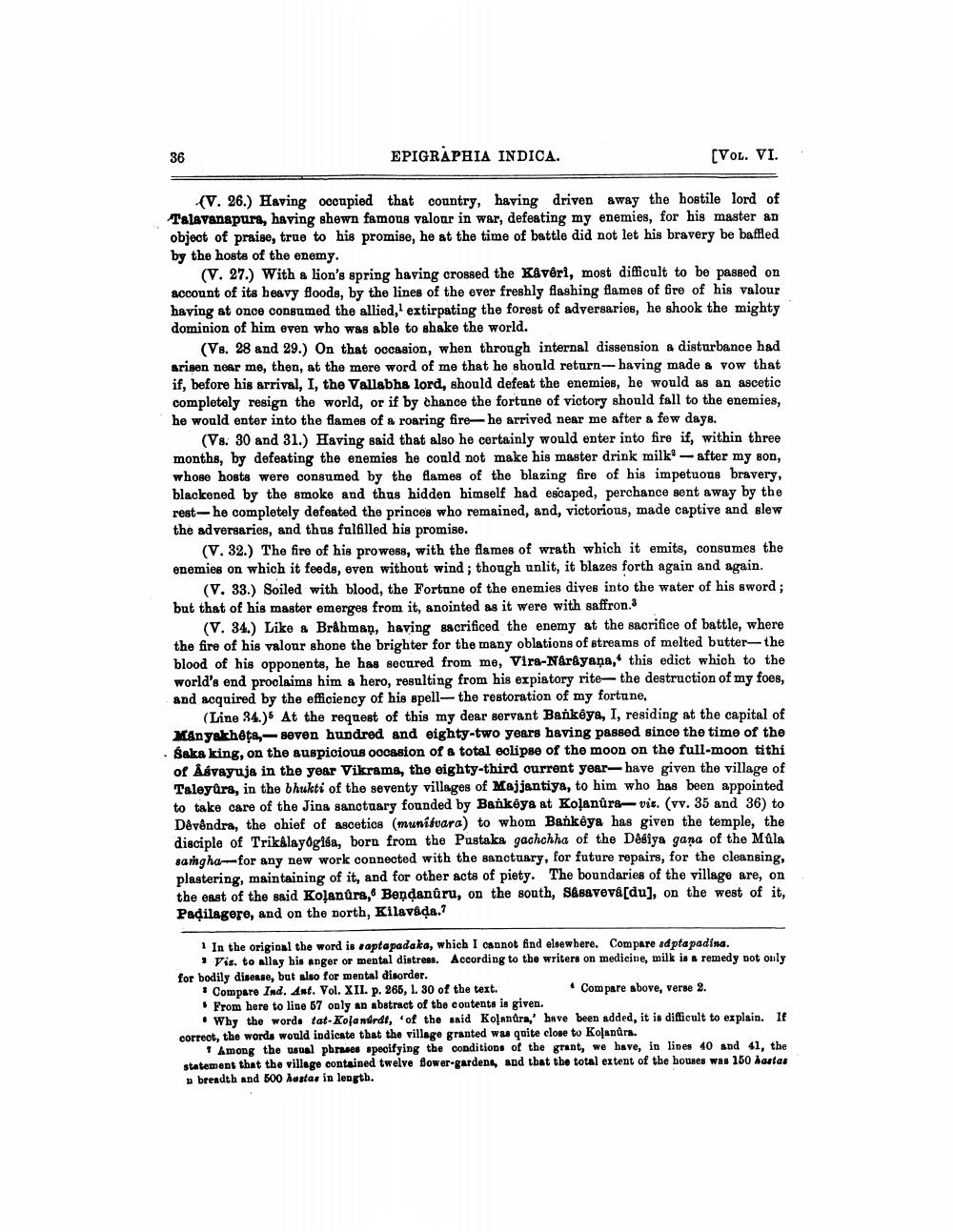________________
EPIGRAPHIA INDICA.
[VOL. VI.
(V. 26.) Having occupied that country, having driven away the hostile lord of Talavanapura, having shewn famous valour in war, defeating my enemies, for his master an object of praise, true to his promise, he at the time of battle did not let his bravery be baffled by the hosts of the enemy.
(V. 27.) With a lion's spring having crossed the Kaveri, most difficult to be passed on account of its heavy floods, by the lines of the ever freshly flashing flames of fire of his valour having at once consumed the allied, extirpating the forest of adversaries, he shook the mighty dominion of him even who was able to shake the world.
(Vs. 28 and 29.) On that occasion, when through internal dissension a disturbanoe had srisen near me, then, at the mere word of me that he should return-having made & vow that if, before his arrival, I, the Vallabha lord, should defeat the enemies, he would as an ascetic completely resign the world, or if by chance the fortune of victory should fall to the enemies, he would enter into the flames of a roaring fire-- he arrived near me after a few days.
(Vs. 30 and 31.) Having said that also he certainly would enter into fire if, within three months, by defeating the enemies he could not make his master drink milk - after my son, whose hosts were consumed by the flames of the blazing fire of his impetuous bravery, blackened by the smoke and thus hidden himself had escaped, perchance sent away by the rest-he completely defeated the princes who remained, and, victorious, made captive and slew the adversaries, and thus fulfilled his promise.
(V. 32.) The fire of his prowess, with the flames of wrath which it emits, consumes the enemies on which it feeds, even without wind; though unlit, it blazes forth again and again.
(V. 33.) Soiled with blood, the Fortune of the enemies dives into the water of his sword; but that of his master emerges from it, anointed as it were with saffron.
(V. 84.) Like a Brahman, having sacrificed the enemy at the sacrifice of battle, where the fire of his valour shone the brighter for the many oblations of streams of melted butter-the blood of his opponents, he has socured from me, Vira-Narayaņa, this edict which to the world's end proclaims him & hero, resulting from his expiatory rite- the destruction of my foes, and acquired by the efficiency of his spell- the restoration of my fortune,
(Line 34.) At the request of this my dear servant Bankêye, I, residing at the capital of Xanyakheta,-seven hundred and eighty-two years having passed since the time of the Saka king, on the auspicious occasion of a total eclipse of the moon on the full-moon tithi of Åsvayuja in the year Vikrama, the eighty-third ourrent year-have given the village of Taleyüra, in the bhukti of the seventy villages of Majjantiya, to him who has been appointed to take care of the Jina sanctuary founded by Bankêya at Kolanûravit. (vv. 35 and 36) to Dévêndra, the chief of ascetics (munitvara) to whom Bankêya has given the temple, the disciple of Trikalayogisa, born from the Pustaka gachchha of the Désiya gana of the Müla samgha--for any new work connected with the sanctuary, for future repairs, for the cleansing, plastering, maintaining of it, and for other acts of piety. The boundaries of the village are, on the east of the said Koļanura, Bendanúru, on the south, S&savevå[du], on the west of it, Padilagore, and on the north, Kilavada.?
1 In the original the word is raptapadaka, which I cannot find elsewhere. Compare adptapadina.
· Vis. to allay his anger or mental distress. According to the writers on medicine, milk is a remedy not only for bodily disease, but also for mental disorder. Compare Ind. Ant. Vol. XII. p. 266, 1. 30 of the text.
Compare above, verse 2. . From here to line 57 only an abstract of the contents is given.
• Why the word. tat-Kolanurdt, of the said Kolandra,' have been added, it is difficult to explain. If correot, the words would indicate that the village granted was quite close to Kolantira.
1 Among the usual phrases specifying the conditions of the grant, we have, in lines 40 and 41, the statement that the village contained twelve flower gardens, and that the total extent of the houses was 150 hastas u breadth and 500 hastas in length.




